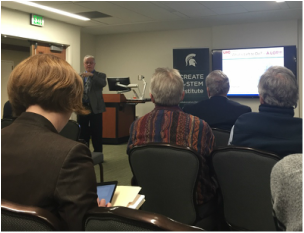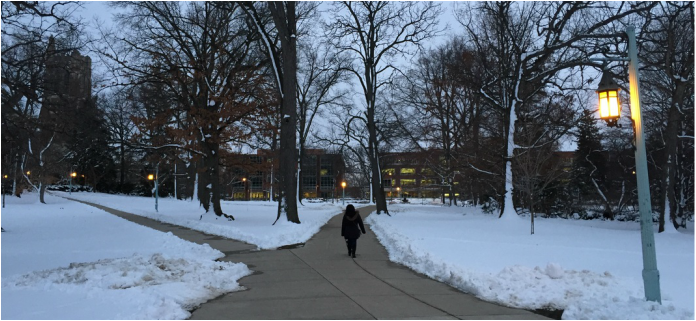
After our 'big' snow last week, I was very glad that the CREATE for STEM mini-conference still was taking place! This MSU research institute strives to improve teaching and learning in STEM (Science, Technology, Engineering, and Mathematics) disciplines from grades K-16. For the fourth year this one afternoon event was filled with many faculty, postdocs, graduate students, teachers, and administrators for two poster sessions and a keynote speaker (Dr. James Pellegrino, pictured here). As a relative newbie at MSU, it was great to meet more people and learn about the fabulous research topics being explored, as well as catching up with some familiar faces!
One of the big areas in education research right now seems to be aligning teaching practices with Next Generation Science Standards (NGSS) and developing assessments to determine whether those practices actually advance their intended learning outcomes. Although NGSS is geared for K-12, it has a useful framework to inform undergraduate teaching and learning (Cooper et al. 2015). At the poster session I was also impressed with work being done to automate grading of student written responses, which even has its own research group - Automated Analysis of Constructed Response. Besides the time savings for instructors, these tools can simultaneously provide data for education research to determine which concepts students have the most difficulty and why. Other areas I learned about looked at retention/attendance in a flipped vs. traditional lecture course, student reasoning on interdisciplinary phenomena, project-based large-enrollment lab courses, student perception of their science identify, and pre-service teacher education that includes field-based research.
Overall I really enjoyed the mini-conference and just wish it had gone on a little longer - so many great projects to learn about and people to meet!
One of the big areas in education research right now seems to be aligning teaching practices with Next Generation Science Standards (NGSS) and developing assessments to determine whether those practices actually advance their intended learning outcomes. Although NGSS is geared for K-12, it has a useful framework to inform undergraduate teaching and learning (Cooper et al. 2015). At the poster session I was also impressed with work being done to automate grading of student written responses, which even has its own research group - Automated Analysis of Constructed Response. Besides the time savings for instructors, these tools can simultaneously provide data for education research to determine which concepts students have the most difficulty and why. Other areas I learned about looked at retention/attendance in a flipped vs. traditional lecture course, student reasoning on interdisciplinary phenomena, project-based large-enrollment lab courses, student perception of their science identify, and pre-service teacher education that includes field-based research.
Overall I really enjoyed the mini-conference and just wish it had gone on a little longer - so many great projects to learn about and people to meet!


 RSS Feed
RSS Feed
